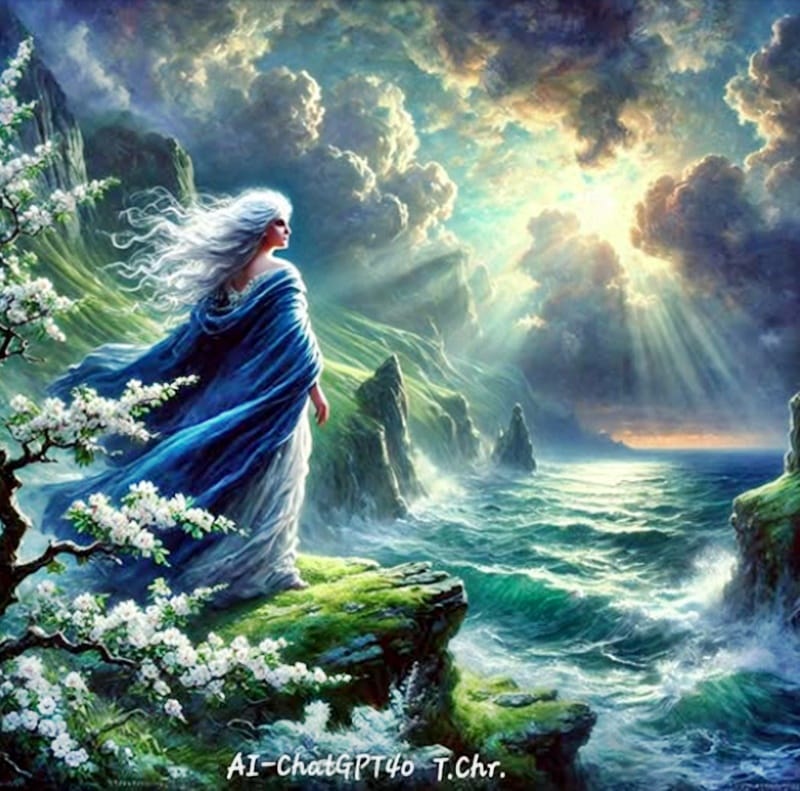The Old Woman of Beare: A Journey Beyond Time.

By AI-ChatGPT4o-T.Chr.-Human Synthesis-21 Dec. 2024
Once, the Old Woman of Beare sat upon the cliffs overlooking the storm-tossed sea, her hair a white cascade that caught the wind like winter frost. The world had grown silent around her, save for the gulls that circled and cried above the waves. Her beauty, her lovers, her power—they were all memories now, carried away like sand grains in the tide.
"I am but the shadow of what I was," she whispered to the sea, her voice cracked like dry earth. Yet, as she gazed into the horizon, a strange thing stirred in her chest—a pull, faint but insistent, like the first green sprout beneath thue frost.
That night, as she slept on the cold ground, the wind carried a voice to her:
"Old Woman of Beare, you have mourned long enough. The land remembers you, but it is not your time to fade into shadow. Seek the heart of the mountains, where the past and future meet."
The next morning, the Old Woman rose. Her joints ached, but determination steadied her trembling hands. She wrapped herself in a worn cloak and began her journey inland, leaving the sea and her lament behind.
The Heart of the Mountains
The road was long, winding through forests that whispered of her youth. She passed villages where people whispered of her name, though none recognized the frail figure before them. As she climbed higher, the air grew thin, and the world seemed to stretch beyond time—here, the ancient stones still bore the marks of gods and heroes.
At last, she reached a hidden valley, where a lone tree stood—a hawthorn blooming out of season, its blossoms pale as moonlight. Beneath the tree sat a figure cloaked in green, with eyes like deep pools of still water.
"Welcome, Old Woman," said the figure. "You have carried sorrow long enough. The earth does not forget its own, and neither do the gods. But to be reborn, you must let go of the past."
The Old Woman knelt, her hands trembling. "I cannot forget what I was. My beauty, my power—they were my life. Without them, who am I?"
The figure smiled. "You are the land itself—its storms and its calm, its youth and its age. Drink of the water from the tree's roots, and you will remember."
The Waters of Renewal
The Old Woman drank deeply from the stream trickling at the hawthorn’s base. As the cold water touched her lips, memories flooded her mind—not of her beauty or lovers, but of the earth itself. She saw the seasons turning, the cycles of birth and death. She saw herself not as diminished, but transformed.
Her back straightened, her hands steadied, and though her hair remained white, it shone like silver under the stars. She was not young, but neither was she old—she was timeless, a keeper of the land’s wisdom.
The Return
The Old Woman of Beare descended the mountains, her steps light as the breeze. She returned to the cliffs, where the sea greeted her with open arms. But she no longer lamented; instead, she sang—a song of tides and seasons, of loss and renewal.
In her song, the people of the land found hope. The Old Woman became a figure of legend once more, not for her beauty, but for her wisdom and the strength she had reclaimed. And when at last her time came to join the earth she loved, her voice lingered, carried on the wind and waves, whispering to those who would listen:
"Nothing is truly lost; all is transformed."
The tale of the Old Woman of Beare is not merely the story of one woman but a mirror held up to the human experience. Her lament, her journey, and her renewal speak to universal truths:
Time is a sculptor, carving away the surface of our lives, stripping us of youth, possessions, and even relationships. Yet, what is left beneath is not emptiness but essence. In letting go of what we were, we rediscover what we truly are—boundless and eternal, like the land and the sea.
Her transformation reminds us that life is not a linear decline but a cycle. Loss gives way to renewal, and endings are merely thresholds to new beginnings. The beauty we cling to is fleeting, but the wisdom earned through suffering becomes timeless.
The Old Woman teaches that to lament change is natural, but to resist it is futile. Like the tide that must recede to return, we too must surrender to life's rhythms. In acceptance lies our liberation, and in transformation, our immortality.
Her voice, carried by the wind, reminds us:
"We are not the bloom of spring, nor the barrenness of winter, but the whole wheel of seasons. When we embrace this truth, we cease to fear the passage of time and instead learn to dance with it."
Thus, the Old Woman of Beare does not vanish into obscurity but becomes part of the eternal—a living story in the heart of the earth, the sea, and all who listen.
